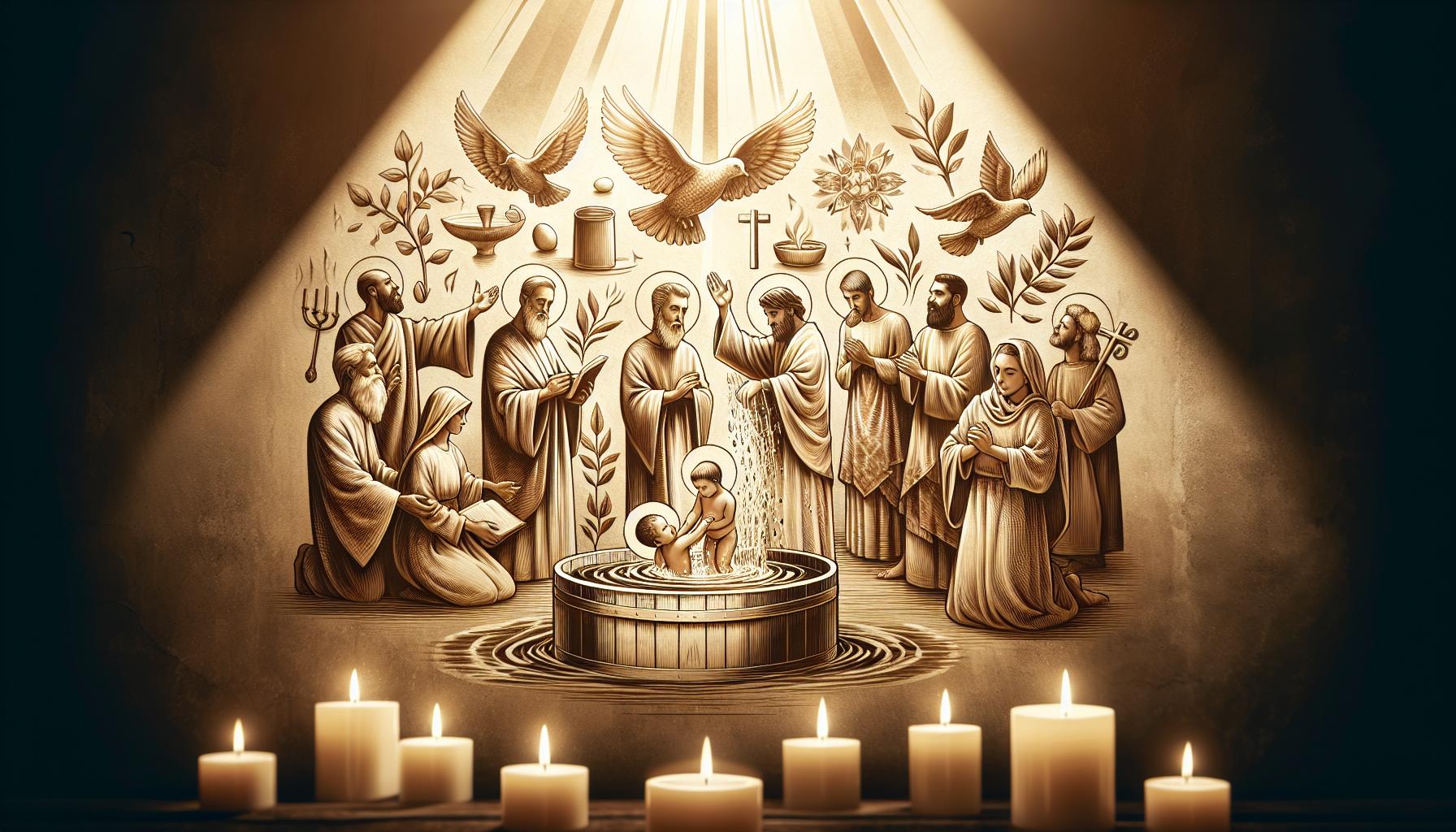Is baptism a vital step for salvation, or can one find grace without it? This question has sparked deep theological debates across various denominations. Understanding the diverse doctrinal views on this topic not only enriches one’s faith but also clarifies common misconceptions, making it a crucial discussion for both believers and seekers alike.
Understanding Salvation: The Role of Faith and Works
Understanding salvation is a complex journey that intertwines the concepts of faith and deeds, shaping the beliefs of countless individuals across different religious backgrounds. At the heart of the debate lies a vital question: do you need baptism to be saved? The perspectives on this issue vary widely, reflecting deeper doctrinal views about the interplay of faith and works in achieving salvation.
The Nature of Faith
Faith serves as the cornerstone of many beliefs regarding salvation. It is often described as a deep, personal trust in a higher power, an acceptance of divine grace, and a commitment to live according to spiritual principles. In Christian theology, faith in Jesus Christ is deemed essential for salvation. The New Testament emphasizes quotes such as:
- Ephesians 2:8-9: “For by grace you have been saved through faith, and that not of yourselves; it is the gift of God, not of works, lest anyone should boast.”
- John 3:16: “For God so loved the world that He gave His only begotten Son, that whoever believes in Him should not perish but have everlasting life.”
These scriptures highlight the significance of a heartfelt belief in Christ. Yet, the debate continues: how does this faith translate into action in a practical sense?
The Role of Works
On the other hand, works—acts of kindness, moral living, and adherence to religious doctrines—play a vital part in the dialog surrounding salvation. Many traditions assert that genuine faith naturally manifests in good works, which serve as evidence of one’s faith. Notably, James 2:26 states, “For as the body without the spirit is dead, so faith without works is dead also.” This verse suggests a synergistic relationship between faith and actions.
A balanced view recognizes that while faith is foundational, it is accompanied by the fruit of that faith in the form of works. Some denominations emphasize sacraments such as baptism as integral, believing that these rites guarantee or signify salvation.
A Comparative Viewpoint
Different doctrinal views lead to diverging practices concerning baptism and salvation. Below is a comparative table illustrating some predominant perspectives:
| Denomination | View on Baptism | Faith’s Role | Works’ Role |
|---|---|---|---|
| Baptist | Symbolic act of obedience; not necessary for salvation | Essential for salvation | Evidence of faith, but not a means to salvation |
| Catholic | Necessary for salvation; removes original sin | Important; part of salvation journey | Essential; must align with faith |
| Lutheran | Means of grace; enhances faith | Critical | Works show faith, but do not contribute to salvation |
| Methodist | Important for salvation | Essential; emphasizes faith and grace | Evidence of faith and relationship with God |
Ultimately, the exploration of whether baptism is essential for salvation reveals a rich tapestry of beliefs regarding the interdependencies of faith, works, and sacraments. Understanding these dynamics encourages individuals to engage in deeper self-reflection about their spiritual journeys and the practices that resonate with their beliefs.
Baptism Across Denominations: A Comparative Perspective
Baptism is a rite steeped in history and significance, often seen as a gateway to salvation or an important affirmation of faith. Yet, the understanding and practice of baptism can vary dramatically across Christian denominations, leading to diverse beliefs about its necessity for salvation. Exploring these different perspectives sheds light on a central question in Christian theology: “Do you need baptism to be saved?”
Variations in Belief
Across denominations, baptism serves as both a symbol of faith and a theological necessity, each with its own unique interpretation. Here’s a comparative overview highlighting key denominational perspectives:
| Denomination | View on Baptism |
|---|---|
| Roman Catholic | Essential for Salvation: Baptism is a sacrament that washes away original sin and is necessary for communion with God. |
| Eastern Orthodox | Vital Sacrament: Considered the means of regeneration; integral for receiving the Holy Spirit. |
| Protestant (Lutheran) | Instrument of Grace: Baptism is a command of Christ that conveys grace, though faith ultimately saves. |
| Reformed (Calvinist) | Sign of the Covenant: Viewed as a sign and seal that confirms the believer’s faith; not strictly necessary for salvation. |
| Baptist | Faith Before Baptism: Practiced as an act of obedience following faith; not a requirement for salvation. |
| Quaker | Inner Experience: Rejects formal baptism; emphasizes personal spiritual experience and transformation. |
Each denomination highlights distinct theological tenets that impact their view of baptism’s role in salvation. For example, Roman Catholics and Eastern Orthodox place significant emphasis on baptism as a sacrament necessary for obtaining God’s grace, while Baptists assert that faith must precede baptism, viewing the latter as an outward demonstration of an inward transformation.
The Role of Personal Faith
Despite these differences, a common thread among various denominations is the focus on personal faith. For most traditions, a sincere belief in Jesus Christ is paramount, transcending the act of baptism itself. This opens up a crucial discussion: can a person possess genuine faith and remain unbaptized, yet still be saved?
Real-world examples abound, such as individuals in emergency situations who express faith yet, due to circumstances, are unable to receive baptism. Many denominations, including certain Protestant groups, emphasize God’s grace, suggesting that His mercy extends beyond the ritual of baptism for those who sincerely seek Him.
Understanding these diverse theological frameworks not only enriches one’s knowledge about baptism but also informs personal belief and practices. As individuals delve deeper into the question—“Do you need baptism to be saved?”—they are encouraged to explore their denominational roots, consider scriptural interpretations, and engage in discussions that can lead to a more nuanced understanding of salvation and grace.
Theological Foundations: Scriptural References to Baptism
The significance of baptism in the Christian faith is profoundly rooted in Scripture, eliciting much debate about its necessity for salvation. Across various denominations, believers turn to biblical texts to ascertain the role that baptism plays in the journey of faith. Understanding these scriptural foundations can illuminate different doctrinal views on whether baptism is essential for salvation.
Key Scriptural References
The New Testament offers numerous passages that contribute to the theological understanding of baptism. Below are some of the most influential verses that various Christian traditions cite:
- Matthew 28:19-20 – The Great Commission: Jesus commands His followers to baptize all nations, highlighting its importance in spreading the Gospel.
- Acts 2:38 – Peter’s declaration on the Day of Pentecost emphasizes the necessity of baptism, stating, “Repent and be baptized, every one of you, in the name of Jesus Christ for the forgiveness of your sins.”
- Romans 6:3-4 – Paul explains the symbolic significance of baptism, identifying it with the believer’s identification with Christ’s death and resurrection, “We were therefore buried with him through baptism into death…”
- 1 Peter 3:21 – This verse indicates that baptism now saves you, “not the removal of dirt from the body but the pledge of a clear conscience toward God.”
Contrasting Interpretations
The interpretation of these passages can lead to varying theological conclusions about the necessity of baptism for salvation. For instance, some denominations, like Baptists and Evangelicals, emphasize that salvation is a work of grace through faith alone, suggesting that while baptism is an important act of obedience, it is not a precondition for salvation. Conversely, traditions such as Catholicism and Orthodoxy view baptism not merely as a symbolic act but as a sacrament essential for salvation, asserting that it confers grace and aids in the believer’s journey toward eternal life.
Those exploring doctrinal views must also consider the narratives of individuals in the New Testament who were baptized, evaluating the circumstances surrounding their baptisms and the implications thereof. For instance, the conversion of the Ethiopian eunuch (Acts 8:26-40) illustrates the urgency and necessity attributed to baptism immediately following belief. In this context, baptism is seen as the believer’s public declaration of faith and an important step towards spiritual commitment, rather than a mere ritual.
In summation, the scriptural references to baptism present a rich tapestry of theological opinions. By examining these verses and their interpretations, individuals can engage in meaningful discussions about the question: “Do You Need Baptism to Be Saved? Exploring Doctrinal Views.”
Historical Context: How Baptism Practices Have Evolved
The practices and significance of baptism have undergone profound transformations since the early days of Christianity, often reflecting the shifting nuances of theological interpretations and cultural contexts. In the early church, baptism was an essential rite of initiation, rooted deeply in Jewish tradition, symbolizing purification and a new beginning. Early Christians viewed baptism as not merely a ritualistic act but as a crucial step toward salvation. This belief led to varying interpretations about whether baptism is necessary for salvation, a discussion that has persisted throughout the centuries.
Ancient Roots
In the early community of believers, baptism held a sacred role. It was closely tied to the ministry of John the Baptist, who preached repentance and immersion in water for the forgiveness of sins. This practice laid the groundwork for the Christian understanding of baptism. As the apostles spread the gospel, the act of baptizing new converts became a fundamental part of their mission. This period saw the emergence of various baptismal practices, including:
- Immersion: Full submersion in water came to symbolize the death, burial, and resurrection of Jesus Christ.
- Affusion: Pouring water over the head was also accepted, particularly for those unable to immerse.
- Sprinkling: This method became prominent in cases of illness or for infants, addressing practical concerns about accessibility.
As Christianity began to spread throughout the Roman Empire, the cultural assimilation of various customs influenced baptismal practices. The adoption of infant baptism in the third century reflected a shift in focus from personal faith to communal belief, indicative of the church’s evolving doctrinal views.
Medieval Developments
During the Middle Ages, the understanding of baptism as a sacrament grew stronger, with theologians like Augustine asserting that it was vital for salvation. The Church emphasized the necessity of baptism for all, including infants, as a means of removing original sin. The connection between baptism and salvation solidified within Catholic doctrine, teaching that the absence of baptism implies exclusion from eternal life.
However, reformative movements in the 16th century, particularly those led by figures like Martin Luther and John Calvin, challenged these long-standing views. They argued for a focus on faith over ritual, emphasizing the grace of God as the true source of salvation, thus shifting the emphasis away from the act of baptism itself. This sparked new discussions centered around the question, “Do you need baptism to be saved?” and led to a spectrum of doctrinal beliefs across various denominations.
Modern Perspectives
Today, baptism is approached differently among denominations. Some assert its necessity for salvation, while others view it as a significant, yet non-essential act of obedience to Christ. For example, while Catholics and Orthodox Christians maintain that baptism is required for salvation, many Protestant denominations advocate for a faith-based interpretation:
| Denomination | Baptism’s Role in Salvation |
|---|---|
| Catholicism | Essential for salvation, must be performed by a priest. |
| Orthodox Christianity | Necessary for entering the faith; seen as the first sacrament. |
| Protestantism | Symbolic act of obedience; faith alone is paramount. |
| Baptists | Believer’s baptism; faith must precede the act. |
In light of this historical context, it becomes clear that the question, “Do you need baptism to be saved?” resonates deeply with theological implications and cultural practices. As diverse perspectives continue to coexist within the Christian community, the ongoing dialogue about the nature and necessity of baptism remains crucial to understanding Christianity’s evolution and its contemporary relevance.
Personal Testimonies: Experiences of Faith Without Baptism
Many people grapple with the profound question of salvation and the role of baptism in their faith journey. While baptism is seen as a significant rite in many Christian denominations, numerous personal testimonies reveal that a deep faith can exist even without this ritual. These stories highlight how individuals have experienced divine grace and transformative faith journeys, emphasizing that spiritual salvation often transcends traditional practices.
Stories of Transformation
One compelling narrative comes from Sarah, who grew up in a community where baptism was highly esteemed. Despite her strong belief in Jesus Christ, her family faced obstacles that prevented her from getting baptized. Feeling the weight of societal expectations, she reached a breaking point. Instead of allowing this to shatter her faith, Sarah sought deeper connections through prayer and community service. “I realized that my relationship with God was not defined by a ritual, but by my faith and actions,” she shares. This personal relationship led to profound changes in her life, reaffirming her belief that divine grace does not hinge solely on baptism.
Another testimony is that of James, who spent years attending church but struggled with the idea of baptism, believing he was not ready. Through personal study and conversations with his pastor, James discovered that much of the New Testament emphasizes faith in Christ as central to salvation. “It was freeing to understand that it’s not the act of baptism that saves us, but our faith in Jesus,” he reflects. His experience reminds us that spiritual illumination often comes through personal exploration rather than adherence to tradition.
Key Insights from Personal Experiences
Personal testimonies often reveal several insights regarding faith without baptism:
- Faith over Ritual: Many individuals emphasize the importance of personal faith and conviction over the act of baptism itself.
- Community Connection: Those without baptism frequently find solace and support in their faith communities, reinforcing the idea that connection can exist outside of sacramental rites.
- Grace is Not Earned: A recurrent theme is the understanding that God’s grace is a gift rather than something achieved through ritualistic acts.
These stories underpin the broader exploration of doctrinal views about salvation. Each testimony serves as a reminder that while baptism is an important tradition for many, it is ultimately the heartfelt faith and relationship one has with God that truly defines salvation.
Practical Implications: Navigating Baptism in Today’s Believer’s Life
In a world with diverse beliefs and practices, baptism remains a significant ritual that prompts individuals to reflect on their faith commitments. For many believers, it represents the first step in publicly declaring their acceptance of Christian teachings, while for others, it raises deep theological questions about salvation. Understanding the practical implications of baptism can help navigate its role in your spiritual journey, fostering a clearer, more confident expression of faith amidst varying doctrinal views.
Understanding Different Doctrinal Perspectives
When exploring questions like “Do you need baptism to be saved?”, it’s essential to recognize the spectrum of beliefs across various denominations. While some traditions emphasize baptism as a prerequisite for salvation, others consider it a symbolic act of obedience that follows an individual’s faith journey. Here’s a brief overview of common doctrinal views:
| Denomination/Tradition | Baptism’s Role in Salvation |
|---|---|
| Protestant | Generally: Not essential for salvation but significant as an act of obedience. |
| Catholic | Essential: Baptism is necessary for salvation and involves cleansing of original sin. |
| Baptist | Symbolic: Fictional baptism is a profession of faith, not a requirement for salvation. |
| Orthodox | Integral: Important and sacramental, normally conducted shortly after birth. |
Understanding these variations allows believers to articulate their own beliefs more confidently. Engaging in open dialogue with others about baptism and salvation can also enhance one’s understanding. It’s helpful to ask thoughtful questions, such as: What scriptural basis supports your view on baptism’s role in salvation? This engagement can often lead to profound spiritual growth.
Taking Action: Your Personal Journey with Baptism
As you navigate your own path regarding baptism, consider the following practical steps:
- Study Scripture: Dive deep into the biblical narratives surrounding baptism. Passages such as Matthew 28:19-20 and Acts 2:38-41 can provide insight into its significance within the faith.
- Reflect on Your Faith Journey: Think about your personal experiences and what baptism means to you. Is it a vital part of your faith, or more of a tradition?
- Consult Your Community: Speak with leaders and fellow believers in your church or faith community. Their insights may help clarify your thoughts and feelings about baptism.
- Consider Consequences: Think about the implications of your beliefs. How does your view on baptism affect your relationship with God and others?
Answering the question of whether baptism is necessary for salvation doesn’t have to be a solitary journey. Joining study groups or attending workshops focused on this topic can equip believers with a broader perspective. Ultimately, your understanding of baptism should encourage a deeper relationship with Christ and an informed approach to faith in today’s complex spiritual landscape.
The Heart of the Matter: Exploring Grace and Redemption
In discussions about faith and salvation, the concepts of grace and redemption often emerge as fundamental themes, crucial for understanding the broader question of whether baptism is necessary for salvation. Many theological debates converge on the idea that grace is unmerited favor from God, setting the stage for redemption through faith. The essence of these principles not only influences doctrinal beliefs but also personally impacts the lives of millions seeking spiritual fulfillment.
The Role of Grace in Salvation
At the heart of Christian theology lies the concept of grace, which many believe transcends ritualistic practices like baptism. Grace is understood as a divine gift that cannot be earned, positioning faith as the channel through which individuals accept salvation. Notably, Ephesians 2:8-9 emphasizes that individuals are saved through grace by faith, not by works, implying that baptism, while significant, is not a prerequisite for salvation.
- Baptism symbolizes the believer’s faith and commitment.
- Grace is freely given and received, highlighting God’s love and mercy.
- Redemption restores the broken relationship between God and humanity.
This understanding opens avenues for dialogue on what it means to be saved and how individuals can secure their relationship with God outside the constraints of religious traditions.
Redemption Through Faith
Redemption, closely linked to grace, signifies being saved from sin and its consequences. Many believers argue that true redemption comes through a sincere heart and faith in Jesus Christ, rather than through the act of baptism alone. Consider the example of the thief crucified alongside Jesus, who, despite not being baptized, was assured of paradise (Luke 23:43). This narrative serves as a powerful illustration of how faith and grace operate independently from the physical act of baptism.
| Aspect | Baptism | Faith | Grace |
|---|---|---|---|
| Nature | Outward sign | Inner belief | Unmerited favor |
| Requirement for Salvation | Varies by doctrine | Essential | Essential |
| Symbolism | Public declaration | Personal relationship | God’s love and mercy |
Ultimately, the interplay between grace, faith, and baptism shapes diverse doctrinal views about salvation, inviting believers to explore deeply personal journeys toward understanding their faith. Whether one believes that baptism is essential or a symbolic act, the crux of these discussions remains anchored in the overwhelming principle of God’s grace and the transformative power of redemption through faith.
Engaging with Community: The Social Aspects of Baptism and Belonging
The moment when an individual decides to undergo baptism is often more than a personal spiritual milestone; it signifies a profound entry into a community of faith. This communal aspect is core to many religious doctrines surrounding baptism, making it a pivotal event not just for the individual but for the congregation as well. Engaging in baptism can foster a sense of belonging, connecting new members with those who share similar beliefs, values, and life experiences.
The Role of Community in Baptism
In numerous faith traditions, baptism is viewed as an initiation rite that ushers individuals into a larger community of believers. The concept of community support during baptism underscores the collective responsibility of nurturing one’s faith journey. Here are several ways community engagement enhances the baptism experience:
- Celebratory Atmosphere: Baptism services are often communal celebrations where friends, family, and fellow congregants gather to witness and affirm the individual’s commitment to faith. This joy-filled environment strengthens social bonds and affirms the individual’s choice.
- Shared Rituals: Rituals surrounding baptism, such as prayers, songs, and testimonials, bring congregants together and allow for mutual encouragement and support as everyone participates in the spiritual journey.
- Accountability and Growth: Entering a faith community through baptism invites accountability. New members often find mentors and accountability partners, creating a nurturing environment where spiritual growth is supported and championed.
Sustaining Connections Post-Baptism
Belonging to a community can significantly enhance the individual’s spiritual journey. Following baptism, ongoing participation in church activities is essential for sustaining these connections. Individuals can engage in Bible studies, volunteer opportunities, or small group gatherings, which further knit them into the fabric of the community. Such involvement not only fosters personal development but also solidifies communal identity and purpose.
To illustrate the importance of ongoing community involvement, consider the following table detailing opportunities for engagement post-baptism:
| Engagement Opportunity | Description |
|---|---|
| Bible Study Groups | Regularly meeting groups to discuss scripture, facilitate understanding, and build relationships. |
| Volunteering | Participating in community service initiatives organized by the church enhances bonds while serving others. |
| Social Events | Church-hosted picnics, retreats, and events create informal settings for fellowship and relationship-building. |
| Mentorship Programs | Connecting newly baptized individuals with seasoned members helps provide guidance and support in their faith journey. |
Ultimately, the social dimensions of baptism and belonging cannot be overstated. Engaging with a faith community enriches the experience and ensures that newly baptized individuals feel connected and supported as they navigate their spiritual pathways. By participating actively and establishing meaningful relationships, individuals can deepen their understanding of “Do You Need Baptism to Be Saved? Exploring Doctrinal Views” while fully experiencing the joys and responsibilities of belonging to a community.
Frequently Asked Questions
Do You Need Baptism to Be Saved?
The question of whether baptism is necessary for salvation is significant and varies among different Christian denominations. While some believe that baptism is essential, others emphasize faith alone as the path to salvation. Understanding these doctrinal views helps clarify this important topic.
What is the role of baptism in salvation?
Baptism is often viewed as a public declaration of faith and an act of obedience commanded by Jesus. Many believe it symbolizes the cleansing of sin and the beginning of a new life in Christ. However, the role it plays in salvation can differ significantly between denominations.
For instance, Catholic and Orthodox churches consider baptism a sacrament and vital for salvation. In contrast, many Protestant groups focus on the primacy of faith, teaching that while baptism is an important act, it is not strictly necessary for salvation because faith alone in Jesus Christ is sufficient.
Why do some Christians believe baptism is necessary for salvation?
Some Christians argue for the necessity of baptism by citing passages in the New Testament, such as Mark 16:16, which states, “Whoever believes and is baptized will be saved.” They believe that this indicates baptism is a crucial step in the salvation process.
Addiitionally, early church traditions emphasize the importance of baptism as the entry point into the community of believers, serving as both a spiritual rebirth and a public commitment to follow Christ. This has led to diverse perspectives on its importance across Christian denominations.
Can I be saved without baptism?
According to many Protestant denominations, yes, you can be saved without baptism. They often point to Ephesians 2:8-9, which states that we are saved by grace through faith, not by works. This suggests that while baptism is an important step, it is not a condition for salvation.
For instance, the story of the thief on the cross (Luke 23:39-43) illustrates that salvation can occur without baptism. This account highlights the belief in faith’s primacy over ritual acts. Therefore, it is important to focus on developing a personal relationship with God through faith.
What are the different doctrinal views on baptism and salvation?
Different Christian traditions hold varying views on the relationship between baptism and salvation. For example, Baptists generally believe in believer’s baptism, emphasizing individual faith, while Catholics and Orthodox Christians consider baptism necessary for salvation.
This diversity reflects broader theological interpretations. Some views stress that baptism is an expression of faith, while others see it as a means of grace. Understanding these doctrinal differences helps navigate conversations about faith and salvation across denominations.
Why does the debate over baptism and salvation matter?
The debate surrounding baptism and salvation matters because it shapes the theological framework within which believers understand their relationship with God. It influences worship practices, community dynamics, and personal beliefs about faith.
Moreover, this discussion encourages deeper contemplation about what it means to live out one’s faith. Engaging respectfully with diverse views fosters unity and understanding among Christians and can enhance the spiritual journey of individuals exploring their beliefs.
How can I learn more about baptism and salvation?
To learn more about baptism and its relationship to salvation, consider exploring reliable theological resources, discussing with local church leaders, or participating in community study groups. Studying scripture and respecting diverse opinions enriches your understanding of this topic.
In addition, you can read informative articles on our site to gain insights into various perspectives within Christianity. This exploration can deepen your faith and enhance your spiritual journey as you seek to understand God’s will in your life.
Wrapping Up
In conclusion, the question of whether baptism is necessary for salvation is one that invites deep reflection and respectful dialogue among various theological traditions. We’ve explored the diverse doctrinal perspectives, from those emphasizing baptism as a vital sacrament to others viewing it more as a symbolic act of faith. The rich tapestry of beliefs surrounding baptism highlights the importance of context, scripture, and personal faith journeys in understanding salvation.
As you continue to ponder these profound topics, remember that engagement with scripture and community can offer invaluable insights. Whether you find yourself in a tradition that embraces baptism as essential or one that views it as an important yet non-essential rite, the core message remains: faith in God and a commitment to spiritual growth are paramount.
We encourage you to delve deeper, ask questions, and participate in conversations that broaden your understanding. Embrace the diversity of thought while holding fast to your convictions. Your journey in faith is uniquely your own, and exploring these questions can strengthen not only your beliefs but also your connection to the wider Christian community. Let’s continue to support one another in our shared pursuit of truth and understanding.





